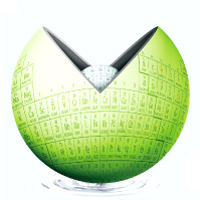
Published for geochemistry community from Geochemical Society of Japan.
Sulfur and carbon isotope analyses of the 2.7 Ga Jeerinah Formation, Fortescue Group, Australia
Geochemical Journal, Vol. 34, No. 2, P. 121-133, 2000
ABSTRACT
Sulfur and carbon isotope ratios have been determined on carbonaceous shales of the 2.7 Ga Jeerinah Formation, Hamersley Group, Australia. The analyses were performed using the Nd-YAG laser microprobe method. The δ13C(PDB) values of organic matter range from -38.3‰ to -35.1‰ with an average of -37.0‰ (44 analyses). These carbon isotope compositions support the previously proposed hypothesis that methanogens and methanotrophs were involved in the carbon cycles in the 2.7 Ga Hamersley ocean. Sulfur isotope compositions are ranging from +0.4‰ to +10.2‰ with an average of +4.6‰ (90 analyses). A notable feature is variable δ34S values within a micro-scale area; approximately 6 to 7‰ variations of δ34S values were detected within 5 × 5 mm areas. Such δ34S variations clearly indicate that pyrites in the Jeerinah shales were formed as a result of the sulfate reduction. This suggests that the 2.7 Ga Hamersley ocean contained appreciable amount of dissolved sulfate, opposing to the previously popular H2S-rich ocean model. Because of no evidence for the hydrothermal alterration on the examined samples, pyrites in the 2.7 Ga Jeerinah shales were most likely formed by the biological sulfate reduction in sediments.- Published : 2000-04-20
- Released on J-STAGE : -
- Received : 1998/01/14
- Accepted : 1999/10/06
- DOI : https://doi.org/10.2343/geochemj.34.121
- J-STAGE URL : https://www.jstage.jst.go.jp/article/geochemj1966/34/2/34_2_121/_article/-char/ja
- J-Online ISSN: 1880-5973
- Print ISSN : 0016-7002
- ISSN-L : 0016-7002
All Issues
- Vol.59, 2025
- Vol.58, 2024
- Vol.57, 2023
- Vol.56, 2022
- Vol.55, 2021
- Vol.54, 2020
- Vol.53, 2019
- Vol.52, 2018
- Vol.51, 2017
- Vol.50, 2016
- Vol.49, 2015
- Vol.48, 2014
- Vol.47, 2013
- Vol.46, 2012
- Vol.45, 2011
- Vol.44, 2010
- Vol.43, 2009
- Vol.42, 2008
- Vol.41, 2007
- Vol.40, 2006
- Vol.39, 2005
- Vol.38, 2004
- Vol.37, 2003
- Vol.36, 2002
- Vol.35, 2001
- Vol.34, 2000
- Vol.33, 1999
- Vol.32, 1998
- Vol.31, 1997
- Vol.30, 1996
- Vol.29, 1995
- Vol.28, 1994
- Vol.27, 1993
- Vol.26, 1992
- Vol.25, 1991
- Vol.24, 1990
- Vol.23, 1989
- Vol.22, 1988
- Vol.21, 1987
- Vol.20, 1986
- Vol.19, 1985-1986
- Vol.18, 1984
- Vol.17, 1983
- Vol.16, 1982
- Vol.15, 1981
- Vol.14, 1980
- Vol.13, 1979
- Vol.12, 1978
- Vol.11, 1977
- Vol.10, 1976
- Vol.9, 1975
- Vol.8, 1974
- Vol.7, 1973
- Vol.6, 1972-1973
- Vol.5, 1971
- Vol.4, 1970-1971
- Vol.3, 1969-1970
- Vol.2, 1968
- Vol.1, 1966-1967
Current Issue:
Stats:
Impact Factor: 1.6 (2024)
Submission to final decision: 9.6 weeks (2022)




